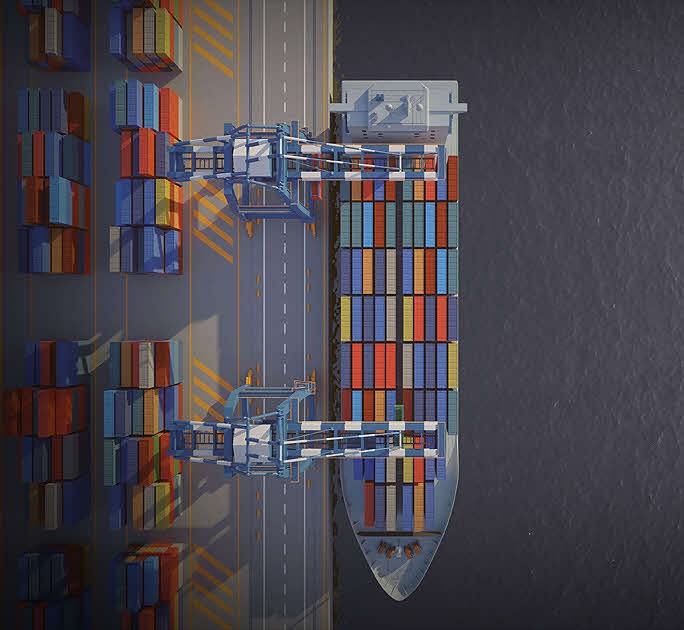Trade Digitalisation: Trends in the New Normal
Given the growing interest in the digital transformation of trade, DBS examines the ways in which digitalisation is redefining supply chains and how the industry can forge ahead through collaboration with governments and industry bodies.

Journey to Digitalisation in Trade
While trade digitalisation has been an enduring trend, the pandemic has seen accelerated activity from corporates, particularly as they recognise that digitalisation is no longer an enabler of operational efficiency, but also a requirement for transformation of business model and a solution to complex business priorities. There are growing efforts and successes in industry-wide project such as alleviating fraud risk concerns in banking.
The benefits of digitalisation are clear, but the realisation of such benefits is much more complex. There is a heavy dependency on cross-border standardisation of regulations, legal frameworks and their interoperability, and the need for extensive collaboration among all participants. Without this, there is a risk of multiple isolated digital islands emerging and the full network benefits of digitalisation being forgone. As a result, corporates are looking to trusted banking partners with demonstrated thought leadership and deep expertise to support them on their digitalisation journeys.
Digitalisation: Drivers and enablers
Various important changes have started to force the pace of trade digitalisation. One important driver is the focus on supply chain resiliency, a key priority for corporates as they look to build more robust supply chains for business continuity. Supply chains are becoming increasingly complex, which increases the number of potential failure points and makes tracking more demanding. Corporates are trying to manage these supply chain challenges, against the backdrop of the “now economy”, where customers are demanding far shorter lead times, creating the need for corporates to manage their supply chains more closely. Public and private companies have responded to these challenges with concerted efforts to digitise physical trade flows.
Recent technological advances have enabled a faster transition to digitalisation. For instance, Application Programming Interface (API) connectivity and data-driven operating models are setting the scene for creation of innovative solutions. They enable banks to embed themselves into customer journeys to deliver seamless trade services. Rapid deployment of Internet of Things (IoT) technology has helped corporates to connect the physical and digital worlds, giving them real-time access to data.
While transition to digitalisation is fundamental to dematerialise trade documents, having a common data infrastructure is a critical component in facilitating digitalisation and maximising its benefits. A good example of how this works in practice is SGTraDex, which was initiated by the group Alliance for Action (AfA) on Supply Chain Digitalisation1, a collaboration between public and private sectors that facilitates trusted and secure data sharing between participants to deliver efficiency, productivity and resilience across physical, information and financial flows.
“We are among the pioneers in the AfA for Supply Chain Digitalisation workgroup that led the conceptualisation of SGTraDex,” says Daniel Lit, Group Head of Documentary Trade Products, DBS. “We co-lead the Technology workstream where the common data infrastructure prototype was developed and tested through the defined use cases and trialled through a series of business simulations with participants across the trade ecosystem.” Subsequent live transactions between DBS and industry players on SGTraDex mark a critical step towards revolutionising trade where digital data at source can be leveraged for real-time and trusted data exchange to facilitate faster decision making and enhance working capital.
An example of the practical benefits of this can be found in the solution to digitise the bunker trade supply, where Singapore is the world leading bunker port. The solution addresses various disadvantages of paper bunker delivery note (BDN) which is costly and inefficient. DBS is the first financial institution that led the co-creation of this industry-first solution, partnering The Maritime and Port Authority of Singapore (MPA) and other likeminded industry players2. Apart from inefficiency, physical BDN carries a significant fraud risk, where the manual reading and input of the mass flow meter showing fuel quantity delivered, is open to collusion between the supplier and receiving vessel captain. In contrast, an e-BDN is generated from the output of an electronic data logger attached to a regulated mass flow meter. This data can be further validated with electronic geolocation data provided by bodies such as MPA. Therefore, e-BDNs reduce the potential fraud risk in the bunkering process, thereby making financing of fuel loads more reliable and secure.
Digitalisation: Driving sustainable outcomes
Investors are taking an increasingly firm line on Environmental, Social, and Governance (ESG) standards. This is reflected in the emergence of sector-specific industry standards, such as Roundtable on Sustainable Palm Oil certification, that put pressure on corporates to comply. Multinationals are managing ESG issues among their suppliers to minimise reputational and business continuity risk. Governments are collaborating to raise regulatory and compliance sustainability standards, with the Association of Banks in Singapore’s Green Finance Industry Taskforce being a case in point.
Corporates are showing greater interest in engaging their banking partners on solutions that help achieve its sustainability agenda. Digitalisation is a natural fit with sustainability by making it easier and cheaper to monitor supply chains in a highly granular fashion to ensure compliance, but also making the exploration of sustainable alternatives commercially viable. It has the additional benefit of streamlining the trickle-down benefit of trade finance beyond the individual corporate to its suppliers further down the supply chain. These entities can benefit from access to working capital if they meet sustainability compliance standards.
DBS collaboration with Inditex3 (one of the world’s largest fashion retailers) sees the bank delivering a sustainable cotton procurement supply chain financing programme to Inditex’s farmer producer organisations, a market first. The programme enables these organisations to procure organic cotton in a timely fashion through a fully traceable and transparent digital supply chain finance solution from individual farmers. Individual farmers have greater visibility of their cash flow and access to working capital, in turn enabling them to better plan their business needs and grow their sustainable farming operations.
HeveaConnect4, a digital marketplace for the trading of sustainably processed natural rubber and a co-creation between Halycon Agri and DBS, is another example.
Digitalisation: Forging ahead through industry standardisation
While the benefits of trade digitalisation are undoubted, there is still a need for industry standardisation, in terms of legal framework, data standards and connectivity. This is especially true for Documentary Trade as it typically requires the original title document such as Bills of Lading to be transmitted across multiple parties involve in the transaction. Though there are workable digital platforms existed for decades, these platforms are mainly closed loop network and reliance on bilateral contractual agreement to manage the title ownership transfer. This has inadvertently made it challenging to scale adoption. With the adoption of UNCITRAL Model Law on Electronic Transferable Records (MLETR) into country legislation picking up, where Singapore is among the first country to amend its Electronic Transaction Act for it to be applied to transferable documents such as Bills of Lading, it does bring about potential for e-Bills of Lading (e-BL) to be transmitted over open networks. “DBS has been in the forefront to promote the use of Trade Trust developed by Infocomm Media Development Authority (IMDA) which is an open-source solution to enable e-Bills of Lading subjected to MLETR.” says Daniel Lit. “We partnered IMDA to promote cross border collaboration on e-BL adoption with trade corridors such as Shenzhen, Abu Dhabi, Australia and have successfully completed pilot trial on Trade Trust with these locations. Such efforts support the dissemination of beneficial digital innovation.”
Nevertheless, it remains a priority for governments to collaborate to develop consistent taxonomies and regulations that extend across multiple jurisdictions. Singapore’s work on Digital Economy Agreements with other nations is an example of how this is achievable in practice, as are its adoption of UN MLETR and IMDA’s TradeTrust. While this is in its early stages, it shows considerable promise, particularly in resolving the interoperability issues of closed loop platforms.
Conclusion: The road ahead
The combination of increasing digitalisation in trade, technology advances and the pandemic have made it very clear that digitalisation is a requirement for business success and survival. Businesses in APAC see banks as the preferred partner for digital support5 to drive transformation. Therefore, any bank worthy of this mission critical role should be able to demonstrate not just exemplary digital capabilities, but also a strong record of practical engagement in driving digitalisation through collaboration with governments and industry bodies.
This article was first published by Global Trade Review in July 2022.
The information herein is published by DBS Bank Ltd. (“DBS Bank”) and is for information only.
The information is not directed to, or intended for distribution to or use by, any person or entity who is a citizen or resident of or located in any locality, state, country or other jurisdiction where such distribution, publication, availability or use would be contrary to law or regulation.
DBS Bank Ltd. All rights reserved. All services are subject to applicable laws and regulations and service terms. Not all products and services are available in all geographic areas. Eligibility for particular products and services is subject to final determination by DBS Bank Ltd and/or its affiliates/subsidiaries.



